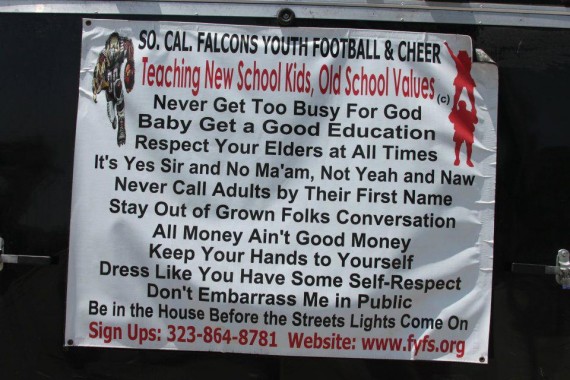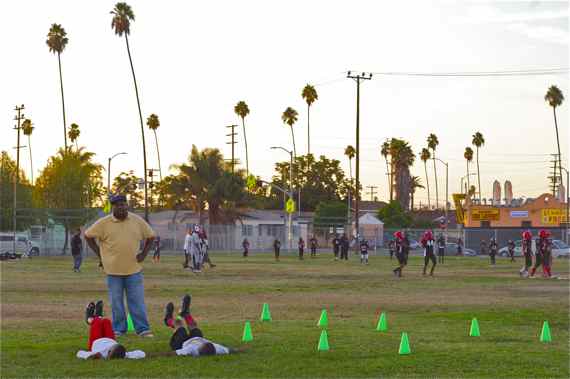
"Oh, school doesn't interest you?" volunteer coach Anthony Thomas asked the 8 year-old boy who had come to football practice with poor marks on his report card.
"School has things to teach you," he said firmly, but lovingly, as he disciplined the boy and another 9 year-old player with similar issues with drills that clearly annoyed them. "You are student-athletes."
I was a little surprised at the explicit emphasis on education, especially since the Falcons, part of the Pop Warner League, were not linked to any particular school. And classes had only begun a few weeks prior.
I was also surprised, I suppose, because over the years that I had tutored football players at USC (many of who came from South L.A.), I had heard a number of them complain that they had had to make a choice between getting their education or playing football. As football (and sports, in general) is often seen as a "way out" for youth from troubled neighborhoods, young men's brains get much less attention than their athletic prowess. Something they are not unaware of.
Sure, maybe he was really smart, one such star athlete agreed when I praised him for his critical thinking skills during a tutoring session. But, where he grew up, the people around him hadn't really cared about his intellectual capacity. Plus, it didn't matter if he was bright, he said. That wasn't going to take him anywhere. College recruiters were not coming down to his neighborhood to court smart youth.
Even once in college, he and others like him sometimes found balancing football and education tough. Coaches called and interrupted a number of sessions I had with athletes or pulled them out of classes for meetings. Good players who genuinely wanted to get something out of their education said they had a hard time staying on track.
Still, I shouldn't have been so surprised to see something different going on at the Falcons' practice.
Keith Johnson and his wife, Karen Provo-Johnson -- the founders of Falcons Youth and Family Services (FYFS, under which the Southern California Youth Football and Cheer programs are housed) -- proclaim "Teaching New School Kids Old-School Values" as their motto. Turning out educated kids who can be a credit to their community is a big part of what FYFS is about.
"Whatever you missed as a child, you give it to your son. You remember how it feels." -- Keith Johnson
Johnson himself has been working with youth for over 20 years. His own upbringing in the foster system and strong faith seem to have made him certain that he had a calling to help youth from troubled neighborhoods find a healthy pathway forward. To that end, he teaches classes to foster parents dealing with the challenges and needs foster youth present and how to overcome them in ways that are beneficial to both the child and the family. He also has found he can use sports and health as entry points through which he can practice the empowerment of black youth.
He first became a football coach years ago, when he felt that his own son's coach wasn't upholding the values he expected of a role model. But, it wasn't until 2005, when Snoop Dogg (er, Lion?) launched a league for youth, that Johnson and his wife took on the responsibility of managing an entire football program.
After being told Snoop Dogg/Lion was not interested in having Johnson's single team join the new league -- he wanted a full roster of teams -- Johnson hustled and pulled together 6 teams in about a month's time. Finding kids who wanted to play was easy, Johnson said. Getting the coaches lined up was a little tougher. But, after three years building their foundation as a program in that league, the Falcons were able to leave and become part of the Valley Conference. They finally joined Pop Warner this past year, said Johnson, because they wanted to be part of a league where a team could have the chance to play in a national championship. Both he and Provo-Johnson looked at the potential of playing a championship game as more than just a chance for the youth to up their game and be rewarded for hard work. It would also be a great opportunity for them to travel outside South L.A. and experience new places, things, and ways of life.
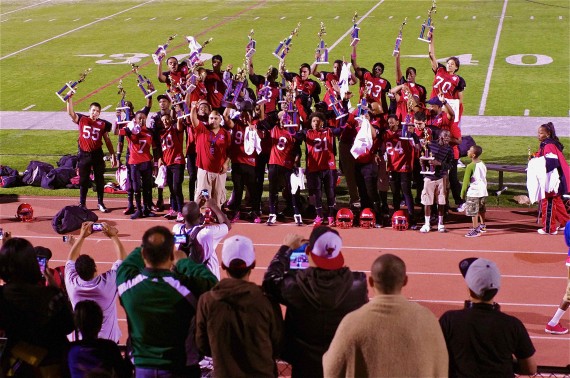
In short, it has always been about more than football for both of them.
"There has to be a place where kids can go and see examples of family," he explained, noting that the majority of the current crop of Falcons -- most of which hail from South L.A. -- reside in low-income, single-family homes.
Even if the families of those players are healthy -- and I met many very caring parents at practices -- the surrounding community may not be. The FYFS website ticks off the problems that, even if not affecting a child's family directly, are likely touching the child in some way:
Gangs: Our program is located in a park [at Bethune Middle School at 69th and Broadway] that is home territory to a street gang and is surrounded by 3 other rival gangs.
Crime: Our program location is in the LAPD 77th Street Division. Currently 77th Street Division has the highest incident rate of crime within the body of LAPD.
Community: In a recent article, our neighborhood, South Los Angeles, was named Los Angeles' most dangerous neighborhood. The drive-by killing of a mother on Christmas Day [2010] and a young child killed while showing off his Halloween costume [2011] are just two sad examples of the dangers that our children face.
Social Demographics: 53% of the residents possess a high school education or lower. 38.6% of children within the area are being raised by their grandparents.
Economic Demographics: 38% of families live below the poverty line.
The coaches involved with the program -- all of whom are volunteers -- are well aware of the issues and work actively to instill a positive set of values in the youth and their parents.
"We are here to support the single mothers," Coach Thomas told me.
If the parents need the coaches to help keep the kid on track at school, the Mobile Homework Trailer is available so kids can catch up and concentrate on their work. If the kids are acting up, coaches try to help with discipline and love.
"We put them to work [doing homework or running drills]. No use in them sitting around and doing nothing," said Thomas of the youth. "We let them know there are consequences; we want them to realize academics comes first."
It is a lesson he has successfully taught his own kids, who he encouraged to go to college and get graduate degrees before even thinking about having kids.
"No need to have them repeat my mistakes," he said, with a laugh and a shake of his head. He did not want to see 17-year olds going around thinking that having babies was a good idea.
"It's not."
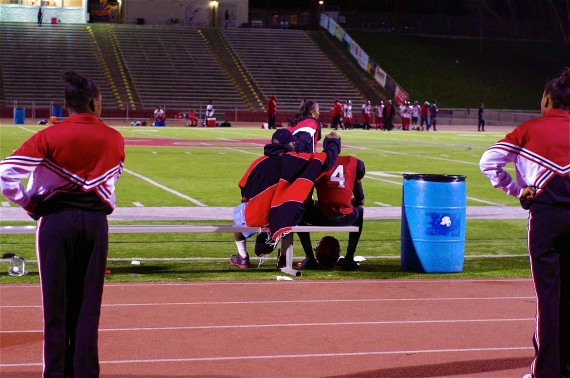
Building stronger communities by example
Coach Thomas' attitude and approach mirrors what Johnson and his wife are trying to build in the wider community. As Johnson explained to me, their goal is as much about teaching the youth as it is bringing parents into the mix, promoting responsible parenting, and creating strong family units.
I saw this firsthand at a parent meeting held in the gymnasium early on in the season. Johnson laid out the ground rules for the upcoming season along with his expectations of the parents. Beyond the basics of asking them to be responsible in picking up and dropping off their kids or not causing drama with other parents, they were given a tough-love talking-to. Parents needed to take an active role in making the practice site a safe place -- chaperoning young kids that had to go to the restroom or making sure that youth not involved in the program didn't come onto the campus and cause trouble, for example. Other things that one might think would go without saying were all spelled out clearly, like the request that the parents refrain from engaging in illegal activity in the parking lot of the school, be it littering or smoking weed.
"Just because you have a card that says you can smoke marijuana," he said, "don't mean that you can smoke it at the school!"
"If Prez [Johnson] or my staff see anybody getting high, you and your kid are gone immediately...Stop getting high in your car with your kids. Period."
Parents broke into applause.
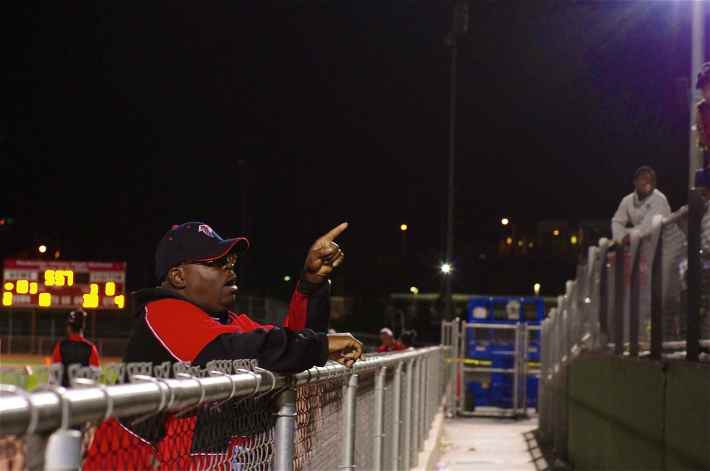
"There you go," said the father standing next to me, clapping and nodding vigorously. "There you go."
In truth, it wasn't necessarily the parents present at the meeting that needed to hear that message. As one father who spoke up put it, those that were there were the ones that could be counted on to be supportive and involved in their kids' lives. It was the parents that weren't present that needed to get on board with the program, something Johnson understood well. Things can get complicated when you have almost 200 youth in a program and an even higher number of parents, many of whom have very little to give their kids in the way of material, time, or even emotional resources.
He knew that about 10% - 15% of the parents couldn't help out, Johnson told the group, "because of the things that they are going through."
As also happens in just about any community, it seems, some parents weren't present simply because they felt they didn't need to be or had personal issues with staff or other parents. Johnson said he was committed to seeing that he and all of his staff were doing what they could to ensure all of the parents felt welcome and encouraged to participate more actively in supporting their children.
Johnson and his wife try to set the example for parents by going above and beyond for the team.
Game days, they are at the field at dawn, and don't usually leave until well after the last game is over, 12 or more hours later. During the intermissions, instead of taking the easy way out and selling hot dogs, Johnson can usually be found grilling up healthier options, such as smoked ribs, salmon, and chicken breast, as a way to raise funds for the organization (a strategy which doesn't usually work, he admitted. The meat is expensive and he spends hours prepping it so it's ready to be grilled on game day). Coaches and staff are put through a mentoring program and workshops in leadership and values are offered for youth. During the summer, they hold Camp HOPE (Helping the Obesity Problem End), an 8-week healthy-eating, wellness-education, and physical-fitness program that caters to the entire family. Provo-Johnson even sustained a tear to her ACL in March, but was still hobbling around with one crutch at a playoff game I attended a few weeks ago, saying she would get it taken care of sooner or later, maybe when she had more time.
As if that wasn't enough, the Falcons worked overtime with the LAPD to support their launch of the Watts Bears, pee-wee teams comprised of youth from the housing developments in Watts. When the LAPD first asked if they could be brought under the Falcons' umbrella and be part of Pop Warner, they had originally planned to have one team from each development.
"That won't work," Johnson had responded.
He agreed to work with the Bears on the condition that the teams were integrated. In other words, each team created had to have kids from Jordan Downs, Nickerson Gardens, and Imperial Courts. Keeping them segregated, he felt, would entrench the very racial and gang problems the LAPD was tasked with trying to counter.*
If you're not going to do it right, don't do it at all, Johnson says.
Their determination doesn't mean that everything works perfectly for the Falcon organization. Parents still get caught up in drama with other parents. It isn't easy for staff to stay up-to-date with the school progress reports of all of the nearly 200 players. Of the 400 youth that participate in the summer Camp HOPE program, there may only be 15 parents that stick around to take advantage of the resources the Johnsons make available to them. But they continue, undaunted. They have only had the football and cheer program for 7 years, and the other programs run through the organization itself are newer still. With time and, they hope, more support from the City or outside agencies, they will see their efforts pay off. And maybe others will take their lead.
"We refuse to be a normal football team," Johnson told me. "The next frontier is seeing others do what we do."
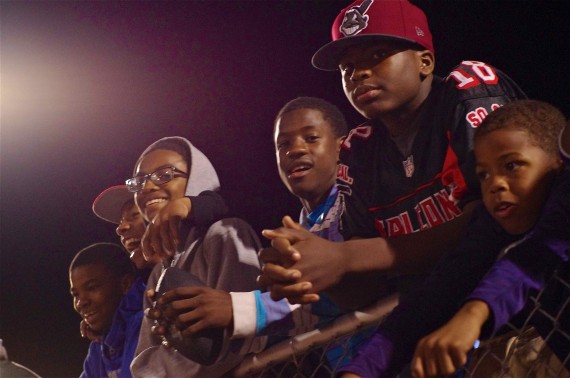
*The creation of the Watts Bears is part of an effort between the LAPD's Community Safety Partnership (CSP) and Housing Authority of the City of Los Angeles (HACLA). The CSP itself was born out of the concerns of the Advancement Project that HACLA was not complying with its obligation to provide a safe living environment for residents within the developments.
